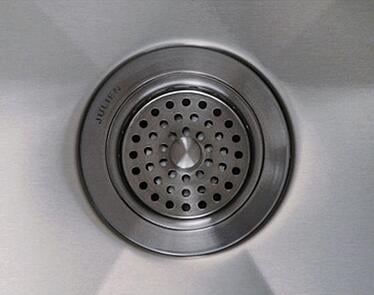If you get a sewer smell when you are using the dishwasher on a kitchen sink, it often means there is a blockage in the vent or the drain of the pipes inside the wall. If you have a clogged vent on the roof, then the back-pressure that is created when you try to put water into the pipe, will slow the water down and it will begin to clog the pipe. In order for water to enter a pipe, it has to have an open vent on the roof of the house. This is a pipe that is attached to the drains, but instead of running down to the city, runs up to the roof. Since both water and air take up volume in the pipe, in order to put the water into the pipe, you have to push the air aside. The vent redirects the pressure up to the roof at the same speed the water is flowing. So if either the drain or the vent are clogged, then there is no place for the water to go without first forcing the air back into the room, which is combined with sewer gas.
Plumbing systems are designed to prevent foul odors from entering the house by means of the trap attached to fixtures. Traps contain water to seal out foul odors; if the water seal evaporates, the odors enter the house. To solve this problem, pour a bucket of water in each trap, sink, shower and floor drain. This will prevent plumbing odors from entering the house.
Foul odors occur from a buildup of food debris within the garbage disposal. To eliminate this drain odor, place ice cubes and lemon or orange peels in the disposal and run for 30 seconds. Next, pour a little liquid dish detergent into the disposal while it is running. To clean out the debris created by the odor removal process, run cold water into the drain for about 30 seconds.
This type of drain odor typically indicates that you have a blocked branch line or vent. You'll need to remove the clog, either by hiring a professional to do it or trying a hand auger. Liquid drain cleaners don't work on long horizontal pipe sections because the cleaners settle on the bottom of the pipe and clean only the lower part of the pipe. If your pipes are made of steel, you should avoid acid-based drain cleaners. Acid eats through the zinc coating on galvanized piping, clearing the way for corrosion. Similarly, cast iron pipe has a tar coating on the inside – and acid will eat through the coating, leaving the iron exposed to the water and corrosion. Even if your pipes are plastic, many of the city mains and services into homes are cast iron.
If you have any more questions about problems you're having with your plumbing system, contact Warner Service to have a professional plumbing technician solve all of your issues.
If you enjoyed this article, subscribe to our blog for weekly updates!


